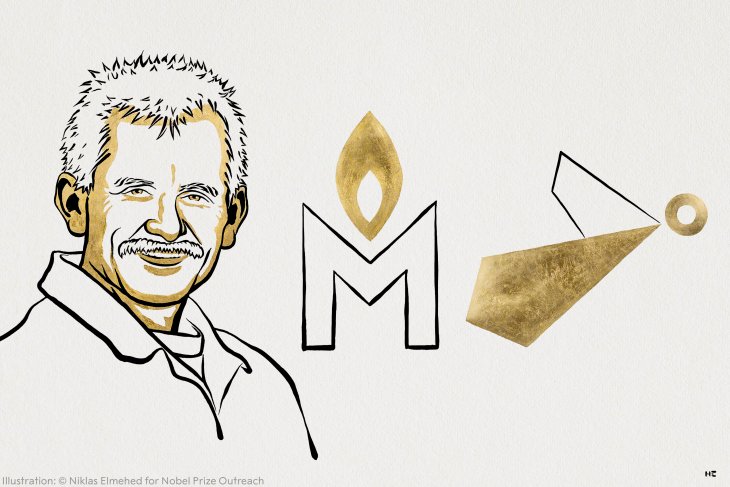The Norwegian Nobel Committee had to make an exceedingly difficult decision this year. At a time of war raging in Europe, was the proposition of a peace prize even relevant?
Ukraine is certainly fighting a just war and deserves every measure of support that the global West can muster, but it is still a party to the war and refuses to talk about peace on Russian terms. It would have been possible to find deserving peace-promoting candidates in other regions of the world, but this would have meant turning away from Europe, where the need to make a difference with awarding the high-impact prize is the greatest.
The committee did find a solution – and it is an excellent one, no doubt.

Ill. Niklas Elmehed © Nobel Prize Outreach
Granting the prize to the Ukrainian Center for Civil Liberties acknowledges the fact that it is not only the brave army that stands against the Russian aggression, but the whole Ukrainian civil society, united in determination to defend independence and liberty and granting the necessary support to President Volodymyr Zelensky. Honoring Ales Viktaravich Bialiatski, the veteran of the struggle for human rights in Belarus and the founder of the Viasna center, gives new impetus to the mass movement for freedom and adds to the people’s power that will topple the autocratic regime in the near future.
Dividing the prize into three parts signifies that, only together, can Ukraine, Belarus and Russia build a truly stable peace in Europe. The Russian case is the most contentious, however, even if Memorial is an absolutely deserving laureate. Russia is an aggressor-state, and most Ukrainians are enraged by the readiness of so many Russians to pretend that the war crimes are inconsequential and to try to go on with their normal lives, as if nothing out of the ordinary is happening. It is only the sudden announcement of Putin’s order to execute mobilization that has shaken this indifference, but while hundreds of thousands of potential draftees are trying to escape, thousands of others agree to take up arms, to kill and die, as ordered.
Anti-war protests in Russia are minor and resolutely suppressed. Indeed, the group of Memorial activists, who have chosen to stay in Russia, received the news about the prize in the courtroom, trying to defend their headquarters, where a huge paper archive on repressions is stored. The Nobel prize will not help them to win the case, in much the same way as it did not help Dmitry Muratov, the 2021 laureate, to save his Novaya Gazeta from closure. The free media in Russia, nevertheless, has proven to be insuppressible, and it lives on not only in dozens of new platforms in Vilnius or Prague, but also in the massive online social networks that defy all attempts of censorship.
There is an awakening of civil society in Russia, despite the imprisonment of Alexei Navalny and the persecution of Vladimir Kara-Murza for high treason. This awakening is still underground, but every defeat that the demoralized and deserting Russian army suffers in Ukraine gives it a new impetus. Putin’s regime will not survive the defeat in the inglorious war of its own making, but it will be for the Russian society to internalize the necessity of this defeat, to acknowledge responsibility and to rebuild the state as a democratic union that will never again be a threat to its neighbors.
Memorial will be a key part of this work, not only in documenting the crimes committed for the fake goals of asserting Russia’s “greatness” and upholding “traditional values”, but also in pawing the way to reconciliation and redemption. Andrei Sakharov (the late Nobel Peace Prize laureate and first chair of Memorial), and Arseny Roginsky (the late co-founder of Memorial), will not be there to lead this endeavor, but their names will inspire new generations of peace activists.
- Pavel K. Baev is a Research Professor at PRIO